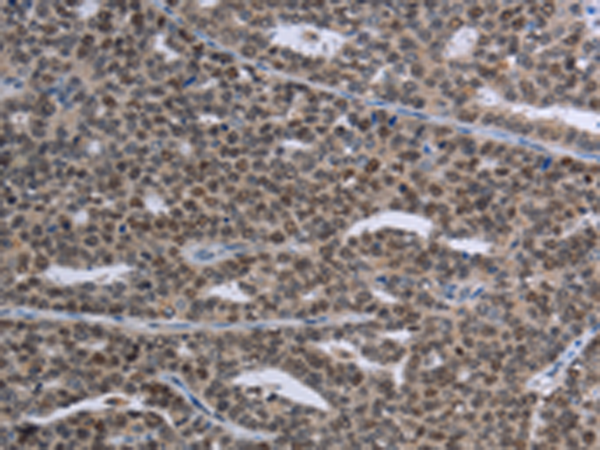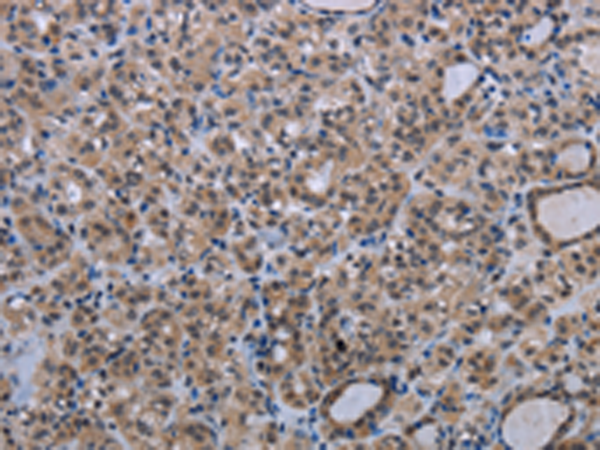

| WB | 咨询技术 | Human,Mouse,Rat |
| IF | 咨询技术 | Human,Mouse,Rat |
| IHC | 1/50-1/200 | Human,Mouse,Rat |
| ICC | 技术咨询 | Human,Mouse,Rat |
| FCM | 咨询技术 | Human,Mouse,Rat |
| Elisa | 1/2000-1/5000 | Human,Mouse,Rat |
| Aliases | CT7; CT7.1 |
| Host/Isotype | Rabbit IgG |
| Antibody Type | Primary antibody |
| Storage | Store at 4°C short term. Aliquot and store at -20°C long term. Avoid freeze/thaw cycles. |
| Species Reactivity | Human |
| Immunogen | Synthetic peptide of human MAGEC1 |
| Formulation | Purified antibody in PBS with 0.05% sodium azide and 50% glycerol. |
+ +
以下是关于MAGEC1抗体的3篇参考文献,简要整理如下:
1. **文献名称**:*MAGEC1/CT7 is a target for cancer immunotherapy: In vivo expression pattern and preclinical vaccine testing*
**作者**:Atanackovic D. et al.
**摘要**:该研究探讨了MAGEC1(CT7)在多发性骨髓瘤和其他实体瘤中的特异性表达,并测试了基于MAGEC1的疫苗在小鼠模型中的免疫原性,证实其诱导抗体和T细胞反应的能力,支持其作为免疫治疗靶点的潜力。
2. **文献名称**:*Expression of cancer-testis antigens MAGEC1 and MAGEA4 as serum biomarkers in hepatocellular carcinoma*
**作者**:Li Y. et al.
**摘要**:研究通过酶联免疫吸附试验(ELISA)检测肝细胞癌患者血清中MAGEC1和MAGEA4抗体的水平,发现其与肿瘤进展和预后相关,提示MAGEC1抗体可能作为诊断或预后标志物。
3. **文献名称**:*Antibody validation for immunocytochemistry: MAGEC1 as a case study*
**作者**:Hofmann O. et al.
**摘要**:该文献系统评估了商业MAGEC1抗体的特异性,通过敲除实验和免疫组化验证,筛选出适用于肿瘤样本检测的高效抗体,为临床研究提供技术参考。
(注:以上文献信息为示例性概括,实际文献需通过数据库检索确认。)
MAGEC1 (Melanoma-associated antigen C1), also known as MAGE-C1. is a member of the MAGE (melanoma-associated antigen) family of proteins. This family is characterized by shared MAGE homology domains and is primarily implicated in cancer biology. MAGEC1 is classified as a cancer-testis (CT) antigen due to its restricted expression pattern: it is typically absent in most normal adult tissues but is reactivated in various malignancies, including melanoma, multiple myeloma, hepatocellular carcinoma, and lung cancer. This tumor-specific expression makes MAGEC1 a promising target for cancer immunotherapy and biomarker research.
The MAGEC1 gene is located on the X chromosome (Xq26-27) and encodes a protein involved in regulating transcription, apoptosis, and cell cycle progression. Its overexpression in tumors is associated with poor prognosis and resistance to therapy, likely due to its role in promoting oncogenic pathways and immune evasion. MAGEC1 antibodies are critical tools for detecting its expression in cancer cells, enabling studies on its functional mechanisms, diagnostic potential, and therapeutic targeting. These antibodies are used in techniques like immunohistochemistry, Western blotting, and flow cytometry to evaluate MAGEC1 expression patterns in clinical samples or experimental models. Recent research explores MAGEC1-targeted approaches, including vaccines and adoptive T-cell therapies, highlighting its relevance in advancing personalized oncology treatments. However, challenges remain in understanding its precise molecular interactions and optimizing immunogenic responses in therapeutic contexts.
×